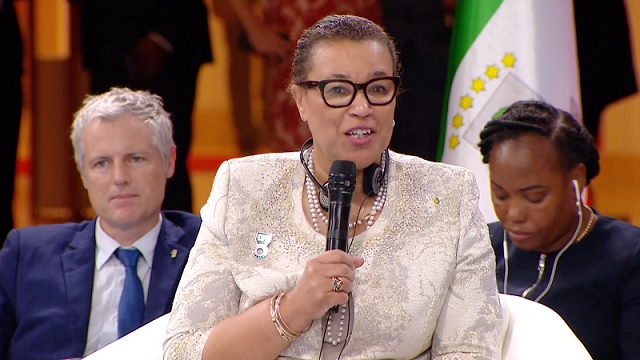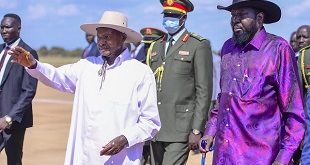
Kampala, Uganda | THE INDEPENDENT | The Commonwealth Secretary-General, Patricia Scotland, has said that collaborative action is vital to prevent the runaway effects of climate change and loss of biodiversity.
Patricia Scotland KC told a One Forest Summit Conference of global leaders and experts meeting in Libreville, Gabon on Thursday that a clear regenerative and inclusive approach is needed to tackle the growing concerns about degradation forests and climate change.
“It is clear is going to take a regenerative approach and it is also clear that it is going to take all of us.
Deforested areas which used to be high in biodiversity are suspected as likely sources of new zoonotic pathogens, suggesting that biodiversity could have negative impacts on human health.
The One Forest Summit Conference is discussing financing solutions for forest conservation and payments for ecosystem services. Scientists from African countries and political leaders are also discussing how to minimize human-wildlife conflict.
Patricia urged Heads of Government, Ministers of State, and world experts to utilize cooperation and partnership to work together on finding the solutions needed to build a stable, peaceful, and prosperous future for subsequent generations.
“If you look at what the experts have been saying – they have all been saying the same things. Number one, we need to collaborate more, number two, we are not going to be able to tackle these crises unless we really understand the data, and number three solutions are going to demand the inclusion of every sector and a multilateral, multinational approach,” she said.
“So, I am glad that most of the countries who have spoken at the Summit are members of the Commonwealth family. We have 56 countries, 2.5 billion people – 60% of whom are under the age of 30 – but the rest are our friends, and we need our friends to solve this crisis.”
Meanwhile Assistant Secretary-General of the United Nations and Deputy Executive Director of the UN Environment Programme, Elizabeth Maruma Mrema said the recent COVID-19 pandemic should be a lesson about the need to conserve our forests so as to minimize wildlife-human life interaction.
Wildlife-life human life interaction has been blamed for the emergence of zoonotic diseases like Ebola, and Marburg among others. Deforestation has been blamed for the spillover of infectious diseases from wildlife to humans.
“By working with nature, we have a unique opportunity to prevent further zoonotic diseases from emerging or spreading,” said Mrema
She suggested the need to work upstream on underlining environmental drivers of zoonotic pandemics including ecosystem degradation and climate change.
Emerging and reemerging zoonotic diseases are a concern for countries like Uganda. Uganda has suffered from a number of Ebola outbreaks.
The most outbreak in September 2022 was of the Ebola Sudan species whose pathogen is yet to be identified.
Experts have suspected that the pathogens could be in a bat in areas where the outbreaks have occurred in the past.
According to Mrema, many pathogens linked with dengue fever or West Nile virus are climate sensitive in terms of rainfall, temperature, and humidity.
She suggested the need for counties to invest in the prevention of zoonotic diseases.
Biodiversity is particularly important for the Commonwealth as it is home to 23% of the world’s land area, 8.8 million km² of forest land, nearly one-third of all oceans, and critical biodiversity ecosystems like the tropical forests species like savanna elephants.
The Commonwealth also includes 400 endemic species – those restricted to geographical areas. Nearly a third (29%) of the world’s megadiverse countries are members of the Commonwealth, with many in tropical regions.
The Commonwealth helps member countries protect their environments and use their natural resources sustainably through programs such as The Blue Charter, The Living Lands Charter, the Commonwealth Sustainable Energy Transition Agenda, and the Commonwealth Climate Finance Access Hub, which helps countries unlock climate finance. As of January 2023, the initiative has unlocked $67.5 million US dollars and an additional $2.9 million US dollars in co-financing.
*****
URN
 The Independent Uganda: You get the Truth we Pay the Price
The Independent Uganda: You get the Truth we Pay the Price



